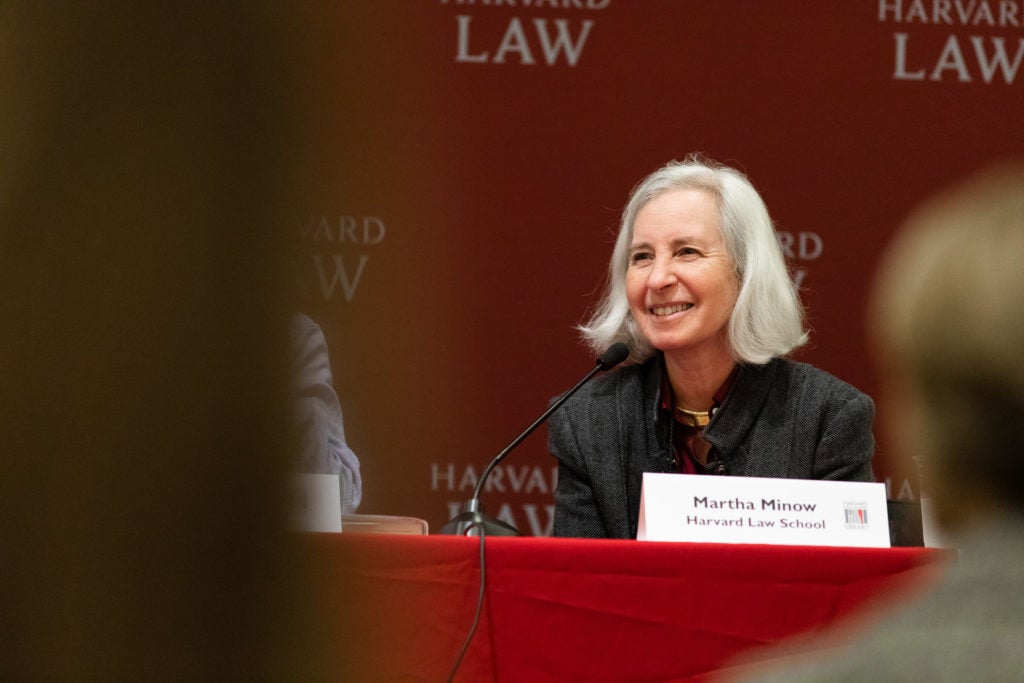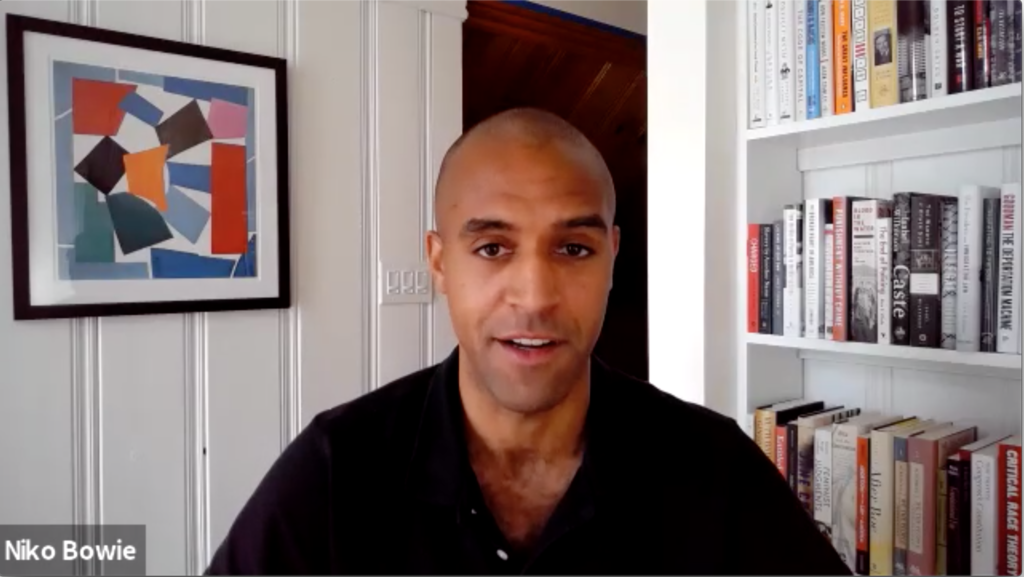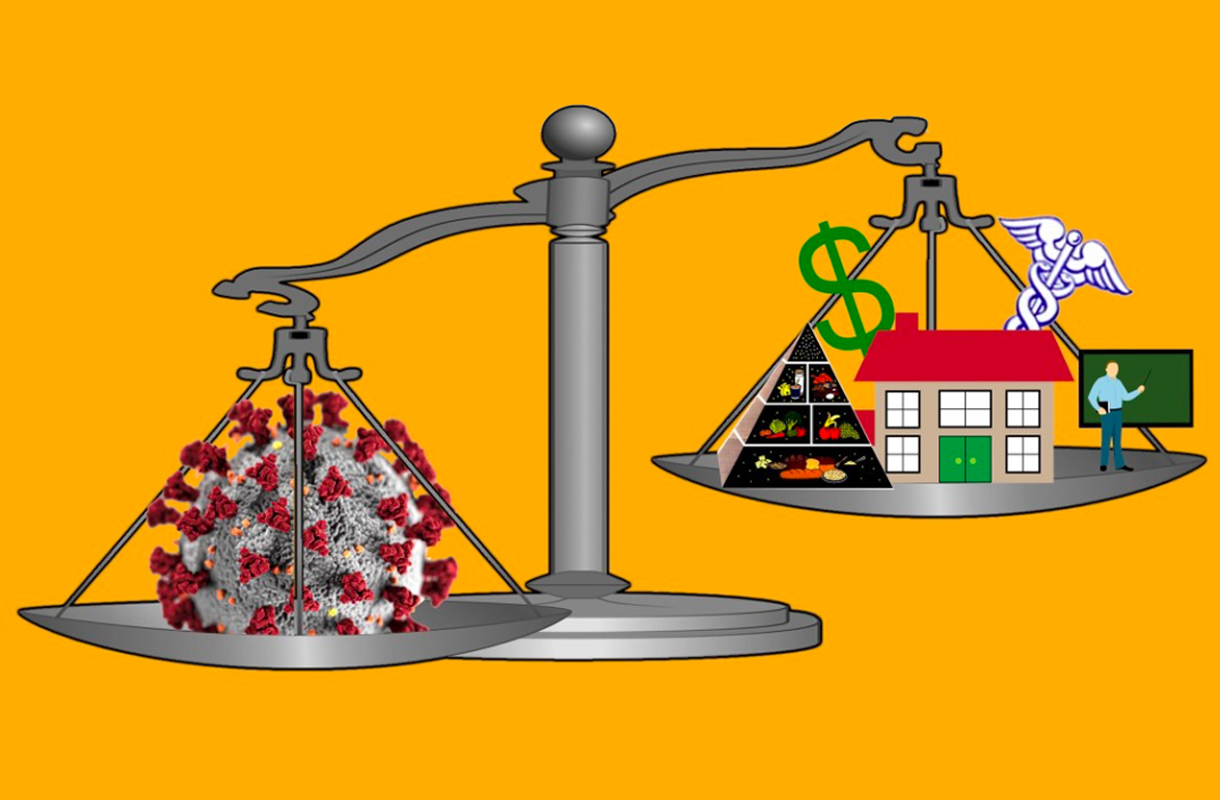One of the most fundamental questions in law is a simple one: who decides? That question is exceptionally urgent during a pandemic, when decisions by governments at every level can have life-or-death consequences.
In the first colloquium of a sweeping new series, “COVID-19 and the Law,” five Harvard Law faculty members grappled with the challenges, limitations, and opportunities of governmental powers during a public health crisis.
The colloquium was the first of 11 sessions focused on COVID-19 topics that will run weekly through mid-November. Other subjects will address areas including health law, elections, education, and access to justice, with a particular emphasis on the urgent needs of marginalized populations, low-income and unemployed Americans, and people of color.
“The pandemic shines a spotlight on the inequities, frailties, and failures, system-wide, in all of our social institutions. That includes legal institutions,” said 300th Anniversary University Professor and moderator Martha Minow, who is co-organizing the series with Clinical Professor of Law Emily Broad Leib ’08, faculty director of the Harvard Law School Food Law and Policy Clinic.

Martha Minow, 300th Anniversary University Professor, is co-organizing the “COVID-19 and the Law” series with Clinical Professor Emily Broad Leib ’08, faculty director of the Harvard Law School Food Law and Policy Clinic.
“COVID-19 and the Law” is one of a trio of series being launched this fall by HLS faculty on pressing topics of COVID-19 and ongoing racial discrimination and injustice. The other two series, “Racial Equality?” and “Policing in America,” will begin later this month.
Panelists addressed essential questions about the scope of governmental powers during a pandemic:
Can governments issue and enforce orders that limit individual freedoms in the pursuit of public health?
With stay-at-home orders and mask mandates making front-page news—and protests about their legitimacy doing the same, the tensions between these twin desires is apparent.
Harvard Law Professor Vicki C. Jackson said that there is no single answer that can resolve the conflict. “It’s clear that governments—state, federal, or city—can limit our freedoms in an epidemic,” she said, citing Jacobson v. Massachusetts, a 1905 case that upheld a state requirement for citizens to get a vaccination against smallpox.
At the same time, Jackson added that “these powers are not unlimited,” noting that the Jacobson ruling itself indicated that general rules—such as requiring vaccinations—might not apply if an individual could show that they would be “particularly injured by a requirement.”
As rules get challenged, Jackson said standards of review may vary, but that they should be “sensitive to the underlying evidentiary basis for the decision. What the science says should matter when it’s urged as a basis for restricting rights in a public health crisis.”
How do different levels of the U.S. government work together—or not—during a pandemic?
Our country’s messy federalist system—defined by disaggregated sources of power —has plenty of flaws, said Assistant Professor of Law Nikolas Bowie ’14. Nonetheless, he said, “the pandemic has illustrated many contexts in which that sort of disaggregation is valuable for everybody.”
For example, concentrated power would have allowed for a faster, more robust response to the pandemic. But such concentrated power has a downside. “Bad leadership would be a mortal danger to the entire nation,” he said.

Instead, during the pandemic, state and local responses—stay-at-home orders and eviction and rent moratoria, for example—offered a way for these smaller government entities to address concerns about pandemic even without a larger federal response.
Still, Bowie noted that there remains a mismatch in power between local, state, and federal governments that will become clearer as time wears on and the economy struggles: only the federal government “has the power to print money, to enter into a deficit, and to power the country through this upcoming recession with stimulus packages and job guarantees.”
How does Europe handle decision making and power during a pandemic?
In Europe, decision-making during a pandemic—with its multiple layers of governance and a patchwork of relevant legal norms—is “a puzzling question,” said Professor of Practice Urs Gasser LL.M. ’03
The top level of decision-making during a pandemic is guided by the World Health Organization’s International Health Regulations, followed by a European layer of laws and regulations that are focused “on supporting and coordinating mechanisms.” Legislation at the national level provides jurisdiction and authority, but significant decision-making is pushed down to state levels, flowing from the subsidiary principle—a key concept across Europe.
The interoperability of these different levels of governance in Europe is not always straightforward, said Gasser, which is not unlike the United States. He argued that the structure worked reasonably well at the higher levels, particularly for sharing information. However, for decisions that get pushed to the state and local levels, “we see fragmentation … of the responses and measures that are taken,” from travel restrictions to decisions on in-person schooling.
In what ways do other professions “fill the gaps” when the government and the law can’t protect everyone?
During the pandemic, nearly every profession responded to the crisis by asking the fundamental questions that drive its field. Those questions helped determine their responses—and in some ways can fill gaps that other fields’ big questions don’t sufficiently address.
For example, said Professor Jonathan Zittrain ’95, “lawyers start by asking questions like … ‘What are the sources of authority by which the government can act to protect everybody?’ ”
By contrast, he said, other professions look at the same situation and ask different questions. Public health professionals ask, “How can [we] protect the common good?” Economists want to know how to support both businesses and people.
Zittrain said the technology community asks, “What sort of gizmos do we have that can make this all go away?” It’s a reasonable question: private industry has built a significant surveillance framework that could be used for contact tracing, provided that privacy concerns could be alleviated.
During the pandemic, why have we (mostly) obeyed the rules?
Compared to the way that it has played out in Europe, the pandemic in the United States has had a particularly strange feature, said Professor Noah Feldman: “extremely little law.”
A series of state orders have formed the rough legal framework for the country’s response to the virus. Yet despite this patchwork of rules, limited enforcement of regulations, and the modest trickle of news stories of people openly defying certain guidelines, citizens have largely obeyed the ordinances that are in place where they live.
Why? Feldman argued that there is something larger than the law or fear of punishment at work. “I think people are listening to the guidance … because they see themselves as part of a collective,” he said. “They’re trying to act more or less responsibly by their own lives under these circumstances.”
Given the level of social and political division in the country, said Feldman, it is remarkable that we are following this “collective unwritten contract.”
As the panelists’ discussion made clear, “law is implicated as both a resource and as a problem,” during a public health crisis, said Minow. There are “many ways in which legal rules and issues, as well as practices and institutions, are tested and illuminated during this pandemic.”
Visit the COVID-19 and the Law Colloquium Series website to learn more about this colloquium and see further resources related to this topic.
